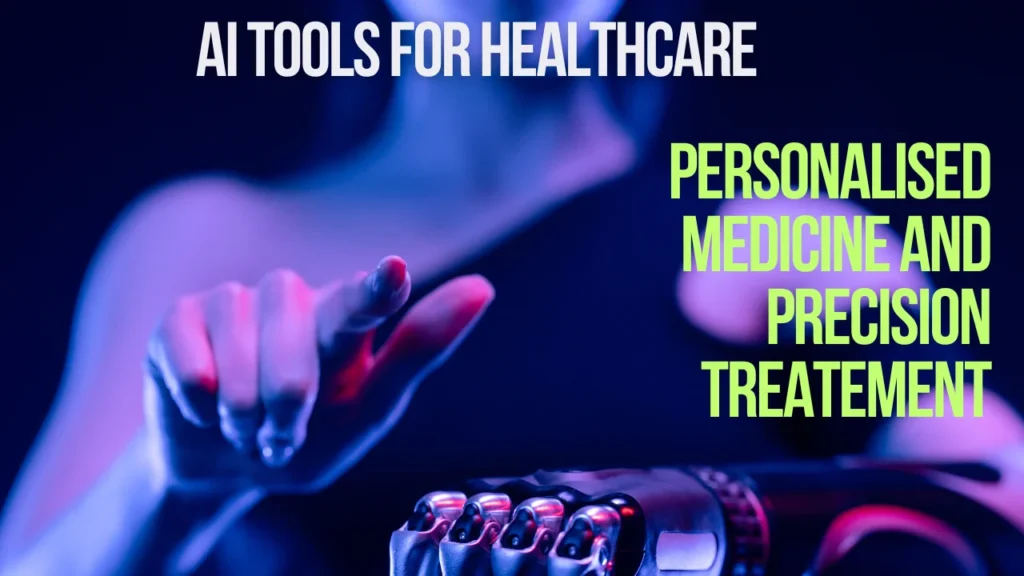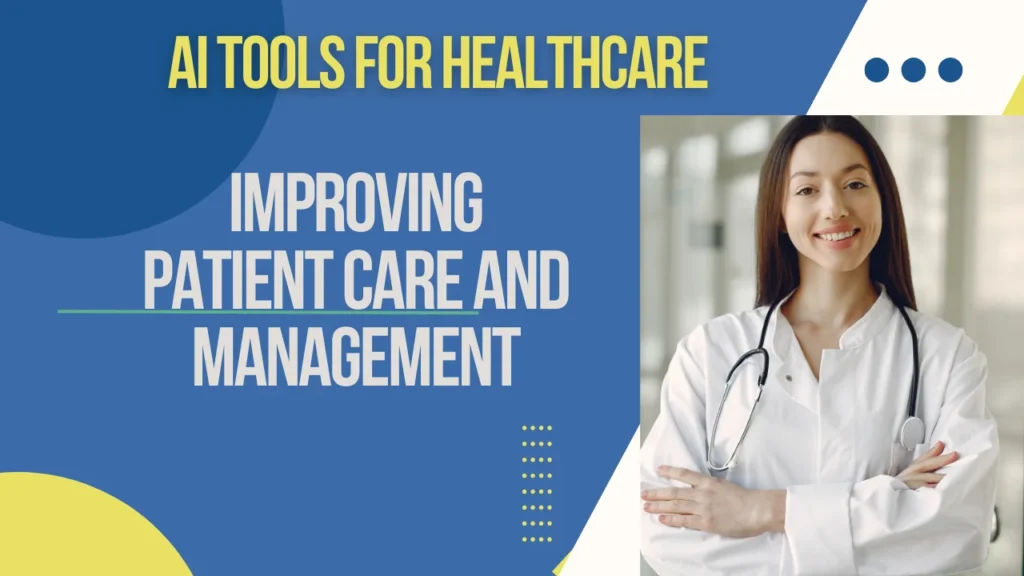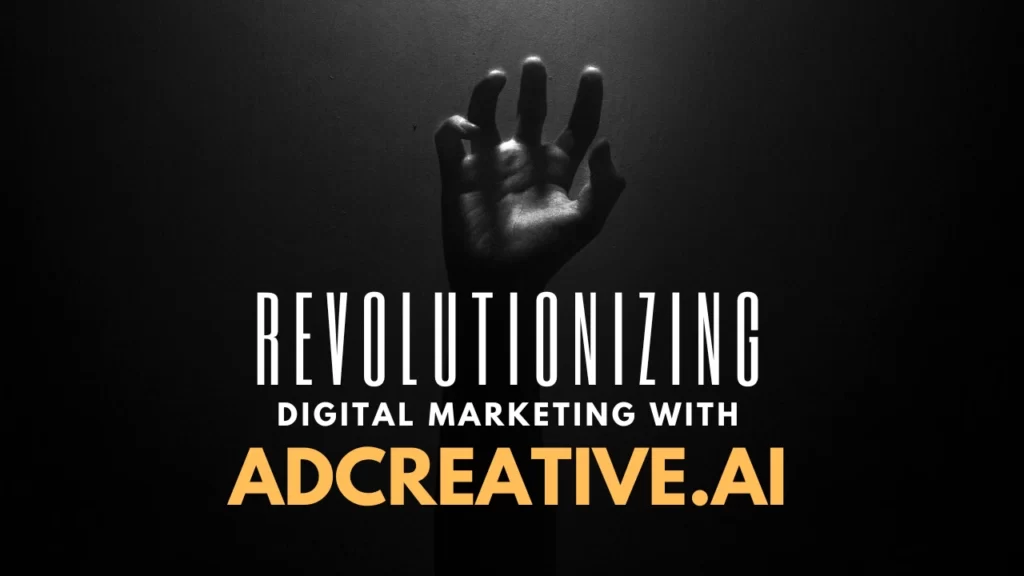The healthcare industry is on the cusp of a revolution driven by artificial intelligence (AI). AI, with its ability to analyze vast amounts of data, identify patterns, and make predictions, is transforming how diseases are diagnosed, treatments are planned, and patient care is delivered. This article explores the various AI tools for healthcare that are making waves, their impact on the industry, and the exciting possibilities they hold for the future.
Diagnosis
One of the most promising applications of AI in healthcare lies in diagnostics. AI algorithms can analyze medical images, such as X-rays, CT scans, and MRIs, with remarkable accuracy, assisting doctors in detecting diseases like cancer, heart disease, and neurological disorders. These AI tools can highlight suspicious areas in scans, allowing for earlier and more accurate diagnoses.
For instance, Paige AI, (paige.ai) a New York-based company founded in 2017, leverages artificial intelligence (AI) to develop digital diagnostics solutions and biomarkers specifically for pathologists, oncologists, and the cancer research community. They collaborate with bio pharmaceutical companies to create customized diagnostic tools and drug development technologies, ultimately aiming to improve patient care in the fight against cancer. This not only expedites the diagnostic process but also reduces the workload of human experts, allowing them to focus on complex cases.
Decision Support
AI is also proving valuable in decision support systems. These systems analyze a patient’s medical history, current symptoms, and available data to suggest potential diagnoses and treatment options. They can sift through vast amounts of clinical research and provide doctors with real-time insights, aiding them in making more informed decisions about patient care.
For example, IBM Watson Health offers a suite of AI-powered tools for clinicians. One such tool analyzes a patient’s medical records and identifies potential drug interactions, reducing the risk of adverse reactions. These decision support systems empower doctors by providing them with a comprehensive overview of patient data and relevant medical literature, ultimately leading to improved patient outcomes.
Personalized Medicine and Precision Treatments
Traditionally, healthcare has adopted a one-size-fits-all approach. However, with AI, the concept of personalized medicine is gaining traction. AI algorithms can analyze a patient’s genetic makeup, medical history, and lifestyle factors to predict their susceptibility to certain diseases and identify the most effective treatment options.

This personalized approach, often referred to as precision medicine, holds immense potential for improving patient outcomes and reducing healthcare costs. For instance, AI can analyze a patient’s tumour and recommend targeted therapies specifically designed for their unique genetic makeup. This can lead to more effective treatment with fewer side effects.
Companies like Grail are developing AI-powered blood tests that can detect multiple types of cancer at early stages by analyzing a patient’s DNA for signs of mutations. Early detection allows for more effective treatment and increases the chances of a full recovery.
Furthermore, AI can be used to predict a patient’s response to specific medications. This can help doctors tailor treatment plans to maximize effectiveness and minimize the risk of adverse reactions.
Revolutionizing Drug Discovery and Development
Drug discovery and development is a slow and expensive process. AI is significantly accelerating this process by analyzing vast datasets of chemical compounds, patient data, and clinical trials to identify promising drug candidates. This allows researchers to explore a wider range of possibilities and prioritize the most effective compounds for further investigation.
For example, BenevolentAI, a leader in AI-driven drug discovery, utilizes machine learning to analyze vast datasets and identify potential drug targets. This can significantly reduce the time and resources needed to develop new medications.
AI can also be used to optimize clinical trials by predicting patient responses and identifying potential safety risks. This can streamline the trial process and bring new drugs to market faster.
Improving Patient Care and Management
Beyond diagnostics and treatment, AI is transforming how patient care is delivered. AI-powered virtual assistants and chatbots can answer patients’ questions, schedule appointments, and provide basic medical advice. These tools can alleviate the burden on healthcare providers and empower patients to take a more active role in their health management.

AI can also be used to remotely monitor patients with chronic conditions. Wearable devices and sensors can collect vital signs and other health data, which can then be analyzed by AI algorithms to detect potential health issues early on. This allows for timely intervention and improved disease management.
For instance, companies like AliveCor offer AI-powered smartwatches that can detect irregular heart rhythms and notify emergency services if necessary. Such tools can be life-saving for patients at risk of heart attacks or strokes.
AI Tools for Healthcare: Healthcare Companies
These are businesses developing or utilizing artificial intelligence for medical purposes. They focus on areas like diagnosis, treatment planning, drug discovery, and administrative tasks. Some well-known examples include IBM Watson Health and DeepMind Health, but many smaller players are innovating in this space.
Generative AI in Healthcare
This exciting branch of AI uses algorithms to create entirely new data, such as realistic medical images or even potential drug structures. This allows for more robust training of other AI models, in silico (computer-based) drug development, and the personalization of medicine.
AI Healthcare Stocks
Investing in the future of healthcare, some stocks focus on companies developing AI technologies for the medical field. These can be high-risk, high-reward opportunities, as the field is constantly evolving. Careful research is crucial before investing in any stock. Three stocks which are expected expect to show solid returns in the coming days due to their their solid AI-induced growth process are Medtronic, Stryker Corporation and NVIDIA Corporation.
AI Healthcare Startups
The potential of AI in healthcare is no longer a future dream, it’s driving a surge of innovative startups. These companies are tackling specific challenges across the medical spectrum. Imagine AI-powered tools that can diagnose diseases with higher accuracy, virtual assistants that guide patients through their care journey, or platforms that accelerate drug discovery.
These startups are more than just possibilities. They’re developing real-world solutions like:
- AI-powered diagnostic tools: Imagine faster, more precise diagnoses leading to better treatment plans.
- Predictive analytics systems: These can anticipate potential health issues, allowing for preventative measures.
- Personalized medicine platforms: Tailoring treatments to an individual’s unique biology for improved outcomes.
- Virtual assistants: Providing patients with 24/7 support and information, easing the burden on healthcare providers.
- The impact of these advancements is far-reaching. They have the potential to:
- Enhance healthcare delivery: Streamlining processes and improving efficiency.
- Improve patient outcomes: Earlier diagnoses and targeted treatments can lead to better health.
- Drive innovation: AI is fostering a wave of creativity across the entire healthcare ecosystem.
AI Tools for Healthcare : Some Startups in the World
Here are some AI healthcare startups around the world who are trying to make a big difference in the medical field.
- Mindstep (United Kingdom): An app for optimizing brain and mental health care.
- Acorai (Sweden): A heart failure monitoring platform.
- Anya (United Kingdom): A startup supporting parents during their first 1,001 days of parental journey — from conception to toddlerhood.
- Biocam (Poland): An endoscopic capsule for real-time determination of potential digestive system threats.
- Cara Care (Germany): A holistic companion for people with digestive issues.
- Deemea (France): A cooperative platform dedicated to medical imaging data.
- Doctomatic (Spain): A remote patient monitoring software where patients can scan the results and automatically provide the data to their doctors.
- Techspert (United Kingdom): An expert network to source the freshest and most precise healthcare insights.
- Tucuvi (Spain): A startup automating medical phone conversations through empathic AI.
- Activate Health (Estonia): A platform that uses data, AI and gamification to help users improve their physical and mental well-being.
- ADNTRO GENETICS (Spain): A DNA kit requiring only a saliva sample to discover personalized nutrition, training, predispositions to diseases and more.
- Clare&Me (Germany): An AI voice coach for anxiety, worries or circulating thoughts.
The Road Ahead: Challenges and Opportunities
While AI offers immense potential for revolutionizing healthcare, challenges remain. One key concern is data privacy and security. AI algorithms rely on vast amounts of patient data, and ensuring the security and privacy of this data is paramount. Robust data governance frameworks need to be established to build trust and encourage patient participation.
Additionally, the potential for bias in AI algorithms is a growing concern. AI algorithms trained on biased datasets can perpetuate existing inequalities in healthcare. Mitigating bias requires careful data selection and ongoing monitoring of AI systems to ensure fairness and ethical use.
Furthermore, the integration of AI into healthcare systems requires significant investment in infrastructure and training. Healthcare providers need to be equipped with the necessary skills and knowledge to effectively utilize AI tools and interpret their outputs.
Despite these challenges, the future of AI in healthcare is bright. As AI technology continues to evolve and healthcare systems adapt, we can expect to see even more innovative applications emerge. Some potential areas of future development include:
- AI-powered robotic surgery for greater precision and minimally invasive procedures.
- AI-driven mental health chatbots offering emotional support and personalized therapy plans.
- AI-powered drug repurposing, where existing drugs are identified for new applications.
To SumUp
AI is transforming the healthcare industry by enhancing diagnostics, treatment planning, and patient care. While challenges remain in terms of data privacy, bias mitigation, and infrastructure development, the potential benefits of AI are undeniable. As AI technology continues to mature and healthcare systems embrace its potential, we can look forward to a future of more accurate diagnoses, personalized treatments, and improved patient outcomes for all.
FAQs on AI in Healthcare
How is AI used in diagnosing diseases?
AI analyzes medical images (X-rays, MRIs) to detect abnormalities and assist doctors in diagnosing diseases like cancer, heart disease, and neurological disorders.
Can AI personalize my healthcare?
Yes! AI analyzes your genes, medical history, and lifestyle to predict disease risk and identify the most effective treatments for you (personalized medicine).
How is AI accelerating drug discovery?
AI analyzes vast datasets to find promising drug candidates, saving time and resources in the development of new medications.
Can AI help me manage my health?
Absolutely! AI-powered wearables and chatbots can monitor your health vitals, answer questions, and provide basic medical advice.
What are the challenges of using AI in healthcare?
Data privacy, bias in algorithms, and infrastructure investment are key challenges that need to be addressed for widespread adoption of AI in healthcare.



